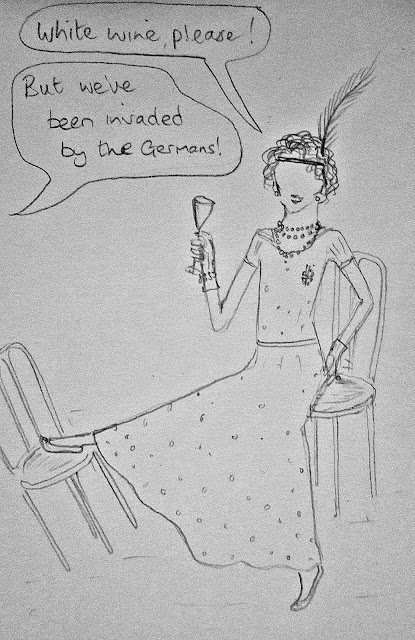Whilst rooting around for a 1916 title for
A Century of Books (you should have seen me, scrabbling through my books, opening covers, reading publication details, reshelving huffily) I stumbled upon
Love At Second Sight by Ada Leverson. It's the third book in
The Little Ottleys, of which I have previously read the first -
Love's Shadow - which was rather brilliant. This is the only time
A Century of Books has really rather compromised my reading plans - in that I skipped past the second title in the trilogy (
Tenterhooks) straight to the third. But someone had spoken on
The Little Ottleys at a recent conference, and given away the plot, so it wasn't as calamitous as it could have been.
Look away if you don't want to know what happened in the first two novels... but they've (to be very brief) set up the fairly loveless marriage of Edith and Bruce; Edith falls in love with Aylmer Ross, but will not leave her husband, even when he asks for a divorce himself (having run off with another woman); he comes back to her, and everything settles down into what it had been before - which is to say, an amusing, charming, patient woman, and an exasperating man. Bruce is best summed up by this wonderful quotation from
Love's Shadow: "
He often wrote letters beginning "Sir, I feel it my duty," to people on subjects that were no earthly concern of his." As for the lovely Edith, I'll hand over to Leverson to describe her. An author should show and not tell, as a rule, but all these qualities in Edith have been exemplified in previous books, so it is forgiveable that Leverson wants to let us know what a wonder she is, so that we can get on with the show.
She was a slim, fair, pretty woman, with more vividness and character than usually goes with her type. Like the boy, she had long-lashed grey eyes, and blonde-cendre hair: her mouth and chin were of the Burne-Jones order, and her charm, which was great but unintentional, and generally unconscious, appealed partly to the senses and partly to the intellect. She was essentially not one of those women who irritate all their own sex by their power (and still more by their fixed determination) to attract men; she was really and unusually indifferent to general admiration. Still, that she was not a cold woman, not incapable of passionate feeling, was obvious to any physiognomist; the fully curved lips showed her generous and pleasure-loving temperament, while the softly glancing, intelligent, smiling eyes spoke fastidiousness and discrimination. Her voice was low and soft, with a vibrating sound in it, and she laughed often and easily, being very ready to see and enjoy the amusing side of life. But observation and emotion alike were instinctively veiled by a quiet, reposeful manner, so that she made herself further popular by appearing retiring. Edith Ottley might so easily have been the centre of any group, and yet - she was not! Women were grateful to her, and in return admitted that she was pretty, unaffected and charming.
Love At Second Sight opens with a scream. The Ottleys' son Archie has, it seemed, used Madame Frabelle's mandolin as a cricket bat, and she is not best pleased. And who might Madame Frabelle be, you ask? The Ottleys want to ask much the same thing. Their delightfully forgetful and absent-minded friend Lady Conroy introduced them (although later denied ever having heard of her, and in fact asks for an introduction herself) - and Madame Frabelle arrives for a visit. Which has lengthened itself into many, many weeks. She is charming, a great listener, given to
understanding people - noticing their subtlest of thoughts, predicting their actions, and invariably being wrong about everything.
Indeed Edith did sincerely regard her opinion as very valuable. She found her so invariably wrong that she was quite a useful guide. She was never quite sure of her own judgement until Madame Frabelle had contradicted it.
Madame Frabelle is determined that Edith is in love with Mr. Mitchell, another of the Ottleys acquaintances. What neither Madame Frabelle nor Bruce notice is that Edith
is in love - with Aylmer, who has returned from fighting in France with a broken leg. Edith has to face a quandary - whether or not to leave her husband...
As I say, I haven't read
Tenterhooks, where a similar story takes place, so I can only contrast this with the first book in the trilogy. In that (again, c.f. my review
here), we see a marriage which is irksome and unequal, but in a comic fashion. All the will-they-won't-they plot concerns a multitude of other characters, none of whom have stayed in my mind, and the central Ottley marriage is stable, if awful. Bruce's absurd lack of self-awareness is hilarious, and his terribleness as a husband is darkly humorous - in
Love At Second Sight, more is at stake, and more than a punchline is likely to come out of this incompatible couple.
Which is not to say that the novel isn't funny. It is very amusing, especially when Lady Conroy wanders onto the scene. Ada Leverson was friends with Oscar Wilde, and his influence is apparent - if anything, rather more so than in
Love's Shadow, because she turns to the epigram rather more frequently in
Love At Second Sight -
par example, '
she was a woman who was never surprised at anything except the obvious and the inevitable'. Sometimes this clash of serious storyline and comic prose was a little disconcerting - I thought the balance worked better in
Love's Shadow - but this is still a wonderful little book.
Of course, what you
should do is get the trilogy and read them in order! I'll read
Tenterhooks one day, and then everything will fall into place properly...



















